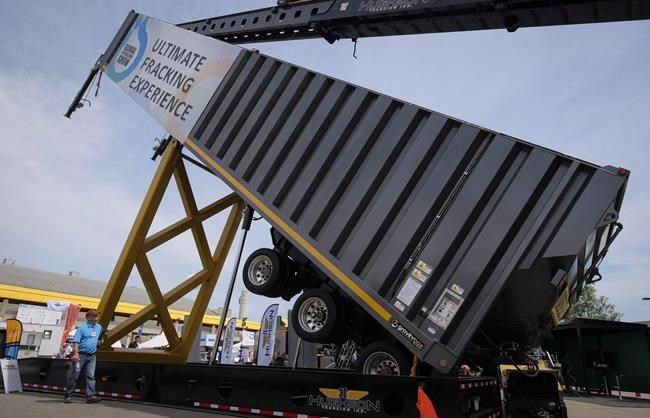 A draft copy of the long-awaited scientific report on fracking for oil and gas raises numerous concerns, but stops short of recommending any curtailment of the process.
A draft copy of the long-awaited scientific report on fracking for oil and gas raises numerous concerns, but stops short of recommending any curtailment of the process.
The 200-page technical report written by an independent panel was leaked to the Times Colonist. Energy Minister Michelle Mungall confirmed the document on Tuesday. Her ministry said a final version was submitted a week ago.
It might take several weeks for the ministry to digest the report before it is formally released, Mungall said. If the final report matches the draft, it will call for more study and oversight while not doing what some environmental groups wanted — recommending a moratorium or a public inquiry into the process.
Fracking, short for hydraulic fracturing, involves forcing fluid down a well into rock formations to fracture them and free up oil or gas reserves. Widely used in northeast B.C., it has been done since the 1950s, and intensified when it was coupled with horizontal-drilling developments in the 1990s.
The draft report cites numerous concerns about shortfalls in the knowledge base about the effects of fracking, mostly to do with water use and disposal.
“From a public-perception perspective, the various activities associated with hydraulic fracturing appear to be unregulated, and this leads to fear and mistrust of the regulators.”
It cited numerous concerns from Indigenous people about the process and frustration with the approval process.
The panel said current regulations might look robust, but there’s not enough information to assess compliance and enforcement.
Although impact on human health was not in the terms of reference, the panel wrote a chapter that said there are significant concerns about the toxicity of the additives in the water used in fracking. “There is general mistrust of the water and people no longer drink from streams.”
The report quoted one expert who told the panel: “We are profoundly ignorant of what is going on.”
The three experts — Diana Allen, Erik Eberhardt and Amanda Bustin — said there is insufficient evidence to assess the health risks from fracking. There are so many unknowns that broad health studies in a region with so few people would not be helpful, it said.
It recommends limiting exposure and openly acknowledging the various risks. Additives are now publicly disclosed, but the panel suggests more comprehensive listing of ingredients. It also recommends making baseline water testing mandatory before drilling.
The panel rapped the industry for building a series of storage dams for fracking water between 2011 and 2016 that “appear to have escaped the proper regulatory oversight.”
They were big enough to require extensive permitting, but were categorized differently. They were built while the permitting regime was being changed.
The panel found it “disconcerting” that the operator of a 20-metre-high dam was ignorant of some requirements and had no questions about permitting. Some operators submitted applications retroactively, and the government approved them last July.
Fracking uses large volumes of water, although the industry is now recycling and reusing it. The panel said there is considerable uncertainty about assessing the potential impact of proposed water use. Qualified professionals need to be more involved.
The report said the baseline data and the ongoing monitoring of surface and groundwater are insufficient. Basic information is “sorely lacking.”
It also called for more assessment of earthquake risk and better seismic mapping before fracking begins.
The panel, created last March, was asked generally to assess risk. It concluded: “The panel could not quantify risk because there are too few data to assess risk.”
The NDP government promised the scientific review in its 2017 election platform, saying it was needed because there was potential for significant expansion of gas production in the future.
Three days after it was announced last March, Premier John Horgan tabled more favourable terms for the liquefied-natural-gas industry. That resulted in a $40-billion investment commitment by LNG Canada last October.



